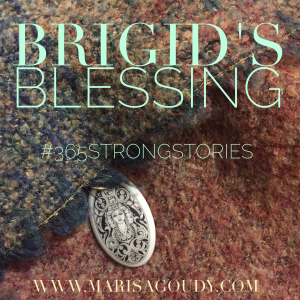
BLOG
Brigid's Blessings, #365StrongStories 32
 We lived one hundred feet from the fastest flowing river in Europe. At least that’s what the guidebooks said.
Those same books also hinted at the legends of fairy forts and the mysteries of those standing stones that anchored farmers’ fields in something even more ancient than Guinness and junior year abroad programs.
We lived one hundred feet from the fastest flowing river in Europe. At least that’s what the guidebooks said.
Those same books also hinted at the legends of fairy forts and the mysteries of those standing stones that anchored farmers’ fields in something even more ancient than Guinness and junior year abroad programs.
We’d been in Galway for six months and had the audacity to call it home. Myth and poetry were the most important things in the world. Even more important than kissing Irish men. Well, that’s the story I’m telling my kids anyway.
And so, on Imbolc, it was time to honor customs that were as old as that frantic River Corrib. Brigid - the goddess who sculpted the land before anyone had ever dreamed of Christ and his saints - this was her night. Legend has it that this is when she passes by, blessing the cloaks of the faithful.
Brigid is one of those handy, all purpose goddesses. In addition to being the patron deity of home and hearth and smithcraft, milk and fire and birthing women, she wore a healing mantle that could be hung on a sunbeam and her coming was the herald of spring.
Being a fresh faced pagan girl on sojourn from a Catholic college, I hung my new shawl in the damp night. I was going to soak up every drip of magic in the Celtic twilight.
Did she stop that night? Did an American girl who knotted her own story with this green, rocky place get the attention of a goddess? That Imbolc feast was almost half a lifetime ago, but I know I met Brigid this very morning in my New York back yard.
She lingered in a warm breeze that had no business shaking the bare trees of a February Hudson Valley. I stood by the summer fire pit in its neat iron bowl, looking back at that house that glowed with the babies I had birthed and nursed.
Without a doubt, I knew she’d graced my every step from then to now.
Bright Brigid blessings to all - especially the brilliant Suzi Banks Baum because it seems that we've been sitting around the same sacred fire all along. Read her St. Brighid's Day post (and learn about the invention of whistling!) here.
